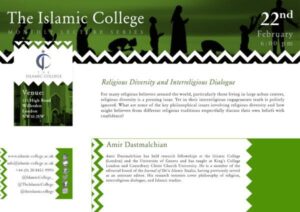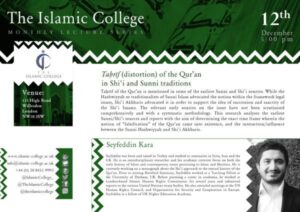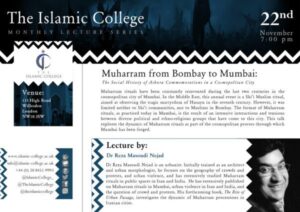Academic Year 2017-2018
Research & Publications » Monthly Lecture Series » Academic Year 2017-2018
Thursday 22 February 2018 – 6:00 pm

Religious Diversity and Interreligious Dialogue
For many religious believers around the world, particularly those living in large urban centres, religious diversity is a pressing issue. Yet in their interreligious engagements truth is politely ignored. What are some of the key philosophical issues involving religious diversity and how might believers from different religious traditions respectfully discuss their own beliefs with confidence?
Amir Dastmalchian has held research fellowships at the Islamic College (London) and the University of Geneva and has taught at King’s College London and Canterbury Christ Church University. He is a member of the editorial board of the Journal of Shi‘a Islamic Studies, having previously served as an assistant editor. His research interests cover philosophy of religion, interreligious dialogue, and Islamic studies.
Thursday 18 January 2018



Humour in Islam and Muslim Civilisation
Muslims today are stereotyped as humourless. Grim images of burning flags and besieged embassies are printed over and over again to represent Muslims. As a result, an entire civilization and culture is regarded as merciless… and also devoid of humour. But is this the reality? Certainly it neglects the abundant evidence of humour in Islamic countries for many centuries. This presentation will explore Muslim humour across the ages. It will begin by looking at modern texts and websites; then proceed to an examination of anecdotal literature referred to as the nawadir genre; and conclude with an exploration of hadith.
Yasmin Amin is finalising a PhD at the University of Exeter on “Humour and Laughter in the Hadith”. She obtained a post-graduate diploma in Islamic Studies from the American University in Cairo in 2006 as well as an MA in Islamic Studies from the American University in Cairo in 2010; her dissertation was on the hadiths narrated by Um Salamah. Prior to that, she had a lengthy career in business administration. She is also a co-editor of the upcoming volume, Islamic Interpretive Tradition and Gender Justice.
Tuesday 12th December – 5:00 pm



Taḥrīf of the Qur’an is mentioned in some of the earliest Sunni and Shiʿi sources. While the Hashwiyyah or traditionalists of Sunni Islam advocated the notion within the framework legal issues, Shiʿi Akhbaris advocated it in order to support the idea of succession and sanctity of the Shiʿi Imams. The relevant early sources on the issue have not been scrutinised comprehensively and with a systematic methodology. This research analyses the earliest Sunni/Shiʿi sources and reports with the aim of determining the exact time frame wherein the notion of “falsification” of the Qur’an came into existence, and the interaction/influence between the Sunni Hashwiyyah and Shiʿi Akhbaris.
Seyfeddin Kara was born and raised in Turkey and studied in seminaries in Syria, Iran and the UK. He is an interdisciplinary researcher and his academic interests focus on both the early history of Islam and contemporary issues pertaining to Islam and Muslims. He is currently working on a monograph about the Shiʿi approach to the textual history of the Qur’an. Prior to joining Hartford Seminary, Seyfeddin worked as a Teaching Fellow at the University of Durham, UK. Before pursuing a career in academia, he worked at London-based Islamic Human Rights Commission for several years and submitted reports to the various United Nations treaty bodies. He also attended meetings at the UN Human Rights Council, and Organization for Security and Cooperation in Europe. Seyfeddin is a fellow of UK Higher Education Academy.
Wednesday 22nd November – 7:00 pm



Muharram from Bombay to Mumbai:
The Social History of Ashura Commemorations in a Cosmopolitan City
Muharram rituals have been constantly reinvented during the last two centuries in the cosmopolitan city of Mumbai. In the Middle East, this annual event is a Shi‘i Muslim ritual, aimed at observing the tragic martyrdom of Husayn in the seventh century. However, it was limited neither to Shi‘i communities, nor to Muslims in Bombay. The format of Muharram rituals, as practised today in Mumbai, is the result of an intensive interactions and tensions between diverse political and ethno-religious groups that have come to this city. This talk explores the dynamic of Muharram rituals as part of the cosmopolitan process through which Mumbai has been forged.
The idea is to articulate how urban society and colonial authorities negotiate through religious practices, a negotiation that can be considered as one of the principles of the cosmopolitan process. This process is not only about the migration of people to a city; it is intrinsically about encountering diverse ethnic, religious, and political groups who co-habit in a place and negotiate social and political relations through different practices, including rituals. The significance of the Muharram rituals in the cosmopolitan process of Mumbai was due to the fact that the ritual was the most important and the biggest festival in Bombay until the early twentieth century.
Dr Reza Masoudi Nejad is an urbanist. Initially trained as an architect and urban morphologist, he focuses on the geography of crowds and protests, and urban violence, and has extensively studied Muharram rituals in public spaces in Iran and India. He has extensively published on Muharram rituals in Mumbai, urban violence in Iran and India, and the question of crowd and protests. His forthcoming book, The Rite of Urban Passage, investigates the dynamic of Muharram processions in Iranian cities.
BOOK CATEGORIES
New Release
- Classical Texts
Shi‘i Theology (Kashf al-Murad fi Sharh Tajrid al-I‘tiqad)
£25.00 Add to basketRated 0 out of 5


